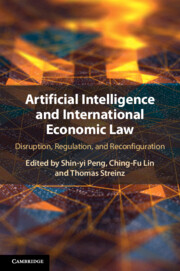Crossref Citations
This Book has been
cited by the following publications. This list is generated based on data provided by Crossref.
Talimonchik, Valentina Petrovna
2021.
The Prospects for the Recognition of the International Legal Personality of Artificial Intelligence.
Laws,
Vol. 10,
Issue. 4,
p.
85.
Read, Katherine
and
Memess, Heather
2022.
Current Awareness.
Legal Information Management,
Vol. 22,
Issue. 1,
p.
67.
Jones, Emily
2023.
Digital disruption: artificial intelligence and international trade policy.
Oxford Review of Economic Policy,
Vol. 39,
Issue. 1,
p.
70.
Kalin, Roman Pascal
2024.
Digital Trade and Data Privacy.
Vol. 38,
Issue. ,
p.
21.
Vasist, Pramukh Nanjundaswamy
and
Krishnan, Satish
2024.
AI’s Impact on Sustainability Targets: A Cross-Country NCA and fsQCA Study.
Information Systems Frontiers,
Kalin, Roman Pascal
2024.
Digital Trade and Data Privacy.
Vol. 38,
Issue. ,
p.
67.
Talimonchik, V. P.
2024.
Prospects of Handling Digital Technology Disputes by Courts of Integration Associations.
Journal of Digital Technologies and Law,
Vol. 2,
Issue. 3,
p.
690.
Baele, Stephane J
Bukhari, Iqraa
Whyte, Christopher
Cuomo, Scott
Jensen, Benjamin
Payne, Kenneth
and
Garcia, Eugenio V
2024.
AI IR: Charting International Relations in the Age of Artificial Intelligence.
International Studies Review,
Vol. 26,
Issue. 2,
Parmar, Aradhana
and
Vijayvergia, Navendu
2024.
AI based System Analysis and Optimization for Robust Indian Criminal Justice System.
p.
1.
Rabajante, Maria Diory F.
2024.
Artificial Intelligence and the Future of International Law.
p.
29.
Kalin, Roman Pascal
2024.
Digital Trade and Data Privacy.
Vol. 38,
Issue. ,
p.
287.
Zaidan, Esmat
and
Ibrahim, Imad Antoine
2024.
AI Governance in a Complex and Rapidly Changing Regulatory Landscape: A Global Perspective.
Humanities and Social Sciences Communications,
Vol. 11,
Issue. 1,
Kane, Thomas B.
2025.
Philosophical approaches to managing generative AI agents as artificial persons at work.
Journal of Business Analytics,
p.
1.
Vindigni, Giovanni
2025.
Between Access Rights and Copyright: The European Accessibility Act as a Regulatory Framework for AI-Generated Content.
European Journal of Management, Economics and Business,
Vol. 2,
Issue. 1,
p.
31.



